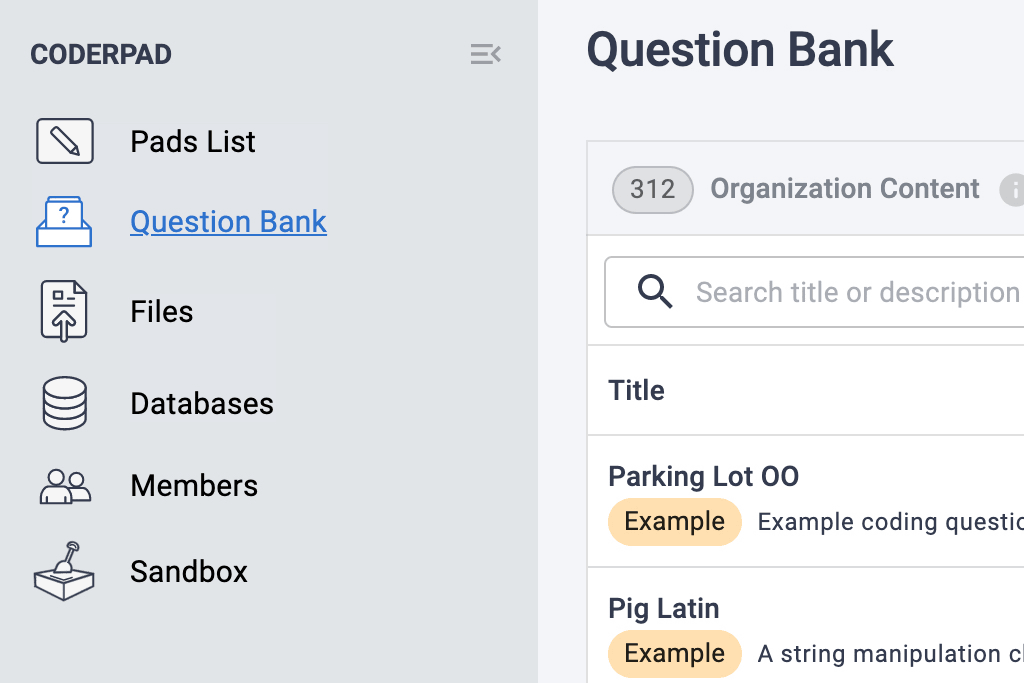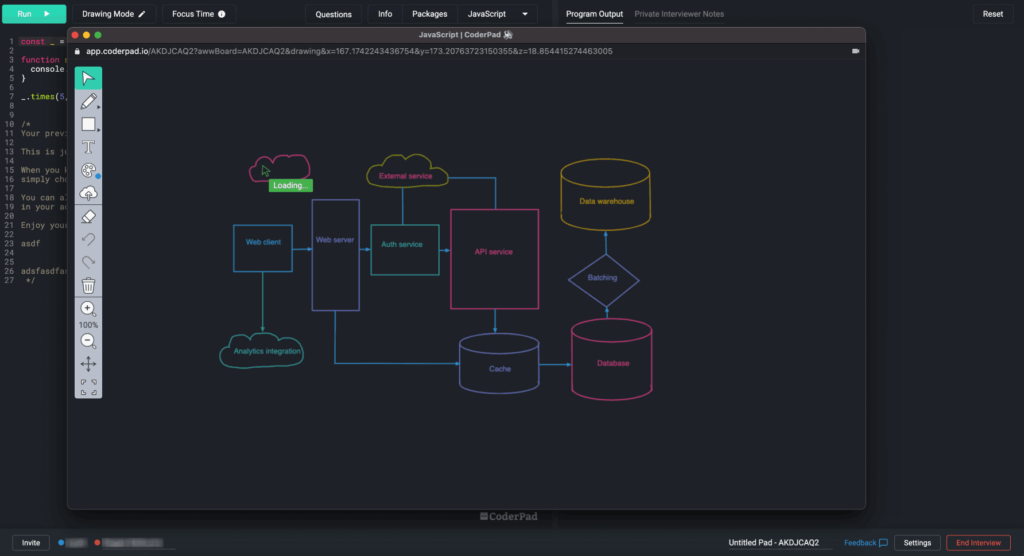Best Practices for Remote Technical Interviews with CoderPad

Now that you have the process down to maximize your technical interview process, you know that CoderPad is designed to be with you every step on the way. Here are some best practices to follow within CoderPad to ensure you get the most out of your experience:
1. Define good interview questions ahead of time
Both “trick” questions (like edge cases that are not clearly explained to the candidate) and generic questions aren’t useful when evaluating technical candidates. They fail to highlight the unique, exciting challenges of the specific role and often have very little to do with the role’s actual responsibilities. A good interview question will effectively uncover someone’s skills, allowing the best candidates to rise to the top of the list. A bad question seeks to trick candidates instead of truly assessing ability.
Ultimately, it’s important to build out a library of coding questions and challenges that are specific to your company, your team and the skill sets you need for success. Leverage internal experts to come up with an interview approach that’s right for this role and your team. Once you’ve agreed on the questions, CoderPad’s Question Bank can be easily personalized to help you create an effective process and hire the best candidates for your team.
2. Thoroughly evaluate candidate skills
There are few things worse than hiring the wrong person. Bad code gets shipped, the team wastes time covering for them, and then inevitably you have to hire all over again. That’s why it’s imperative that you thoroughly evaluate your candidate’s skills in these four areas:
Code quality
- Create a rubric that is used by both hiring manager and developer interviewers to define good code versus bad – and ensure you’re all on the same page.
- Ensure the candidate’s code follows industry standards. Do they look for libraries to solve problems or try to build an implementation from scratch?
- Good organization during their interview implies the candidate follows best practices and cares about ensuring others can follow their work. Comments are important as well – they can be an indicator that the person is a good communicator and a good teammate.
Language proficiency
- Ensure you have problems and questions baked into your interview process that help define their proficiency. Make sure your candidates are able to explain their technical choices in the context of the language they’re working in. This will help you understand their level of expertise in that language.
- CoderPad supports 30+ languages. Live questions can be set up to allow the candidate to choose their language. CoderPad gives candidates the chance to work in a language they’re comfortable with, ensuring the interviewers can see how proficient they are.
Thought process and problem solving
Coding together in CoderPad live pads is a great way to truly gain insight into how your candidate thinks. Some advice for you:
- Give your candidate room to think, perhaps by using our industry-
leading feature Focus Time. It’s designed to give candidates more space and comfort to do their own work – not participate in a stress test. - Sometimes it’s necessary to give the candidate the answer just to move things along – but be sure to note this in interviewer feedback.
- Focus on collaborating and building a problem in real time. For example, give your candidate questions with multiple levels and see how they react as the complexity builds. Since you’re coding together in a live pad, you’ll be able to dynamically react.
Before any interview begins, it’s important to know the criteria an ideal candidate would meet. That way, you can consistently evaluate candidates and reduce unconscious bias. Some advice:
- Do the challenge yourself ahead of time or assign to someone on the team to ensure it feels reasonable.
- Creates a list of things you’re looking for in a solution as well as common pitfalls, ideally within your grading rubric for each question.
- Put this information in the internal notes of the Question in CoderPad so every interviewer has access to it and can use it during the interview.
- Prep your interviewers ahead of time.
Systems Design
CoderPad’s Drawing Mode enables collaborative interviews, and is especially helpful when mapping out systems designs. With it, candidates and interviewers can sketch using shapes, lines, and text on a blank canvas or overlaid on uploaded images or diagrams. Drawing Mode even allows you to upload an actual diagram of your systems so you have a real visual to talk through. This handy feature is especially useful for more senior-level positions. These candidates are often responsible for organizing complex plans, discussing why it’s important to have separation of responsibilities, and how systems will communicate with each other.

3. Ensure a consistent experience
A consistent and fair process for every candidate creates a level playing field instead of an over reliance on resumes. Make sure:
- The process is smooth for everyone by ensuring that both interviewer and candidate have the option to practice ahead of time and receive clear communication.
- You focus on reducing unconscious bias. Ensure interviewers know what is acceptable to discuss in the context of an interview and that they follow a homogenous process. Using CoderPad throughout the hiring stages ensures you don’t over-index on candidates who are just good at navigating interviews but don’t have the technical chops.
- Always save some time at the end of the interview to answer any candidate questions.